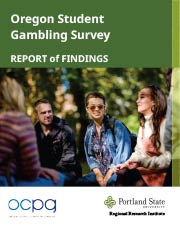Showing Up for Your Loved One
Watching someone you care about struggle with gambling can be painful and confusing. You may feel unsure of how to help or worried about saying the wrong thing. While you can’t control someone else’s behavior, your support and encouragement can make a real difference. Being present, listening without judgment, and learning more about gambling-related harm are important first steps. This section offers tools to help you talk about gambling, set healthy boundaries, and connect your loved one—and yourself—with the support and resources you both may need.

Support a Spouse, Partner, or Adult Child
Supporting a spouse, partner, or adult child who is struggling with gambling can be emotionally challenging. You may feel hurt, frustrated, or unsure of what to do. While every situation is different, these steps can help you navigate the process with care and clarity:
- Set clear, healthy boundaries around finances, responsibilities, and communication.
- Avoid enabling the behavior—support the person, not the gambling.
- Encourage them to seek professional help or peer support, but respect their pace.
- Take care of your own emotional and mental health—your well-being matters too.
- Consider attending a support group like Gam-Anon for families and loved ones.
- Have open, non-judgmental conversations focused on concern, not blame.
If you’re looking for support or not sure where to start, OPGR can help you explore available options. They offer free and confidential ways to connect with treatment, support services, and information tailored to your needs. Visit opgr.org or call 1-877-MY-LIMIT.

Support Your Teen or Young Adult
Talking to your teen about gambling can be challenging, especially with the rise of online gaming and sports betting. Here are some ways to support and guide them:
- Learn how gambling-like features (e.g., loot boxes, skins betting) appear in games your teen may use.
- Talk openly and early about the risks of gambling, just like you would with substances or peer pressure.
- Ask questions and listen without judgment to encourage honest conversations.
- Set clear expectations around gambling behavior, screen time, and money use.
- Monitor gaming and online activity, especially platforms that allow real or simulated betting.
- Encourage healthy coping strategies and social activities that build resilience.
- Reach out for support or resources if you’re unsure how to navigate concerns.
Related OCPG Research

Oregon Adolescent Preliminary Results Gambling Behavior Study (2016)
The 2016 Oregon Youth Gambling Behavior Study surveyed 1,503 adolescents ages 12–17 and their parents. Nearly 89% engaged in social gaming, with 22% spending money. Youth with gambling parents were significantly more likely to gamble. Findings highlight early exposure, family influence, and limited gambling-related conversations at home or school. Download

Oregon College Student Gambling Survey Report of Findings (2024)
The 2024 Oregon Student Gambling Survey found that about half of college students gambled in the past year, mainly lottery and casino games. While most reject gambling myths, 13% scored moderate to high risk on the PGSI. Students supported university concern about gambling but reported limited campus outreach or education. Download
Supporting Your Teen’s Mental Health
Gambling can sometimes be a way for teens to cope with stress, anxiety, depression, or other mental health challenges. It may start as a distraction but can quickly become harmful. Supporting your teen’s mental health—through open communication, healthy coping strategies, and access to help—can reduce the risk of gambling problems and strengthen overall well-being. Understanding the connection between emotional struggles and gambling is an important step in prevention and support.
Related Article
Dealing With Youth and Risky Behavior
Teens often experiment with risky behaviors as they test boundaries and seek independence. Gambling, like alcohol, drugs, and sex, can be part of that landscape—especially when it offers a sense of escape or excitement. These behaviors often overlap and may signal deeper emotional or mental health needs. Talking early and openly about risk, consequences, and healthy choices can help teens make informed decisions and feel supported as they navigate complex situations.
Tips for Parents & Caregivers:
- Start conversations early—don’t wait for a problem to arise.
- Use real-life examples or media to spark discussion.
- Avoid judgment—listen first, then guide with facts and empathy.
- Help teens understand how gambling compares to other risks like substance use and unprotected sex.
- Encourage critical thinking about peer pressure, media influence, and social norms.
- Reinforce healthy coping strategies and provide access to trusted adults or counselors.
Related Document

Tips on Youth Marijuana, Alcohol and Prescription Drug Use and Brain Development
This SAMHSA resource provides evidence-based guidance for parents and caregivers on talking with youth about marijuana, vaping, prescription drugs, alcohol, and brain development, including practical conversation tips, safety information, and links to additional national prevention materials. Download


